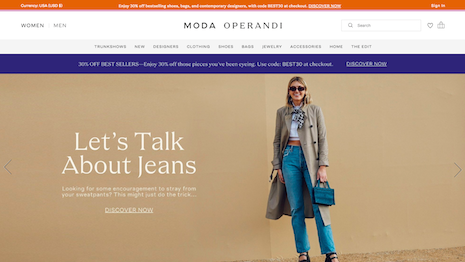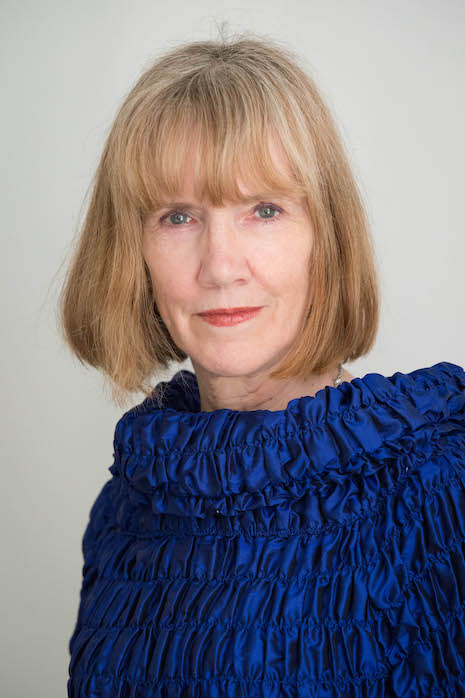- About
- Subscribe Now
- New York,
April 16, 2020

 Moda Operandi, one of the leading online retail platforms, is known for its trunk shows and nurturing emerging talent. Image credit: Moda Operandi
Moda Operandi, one of the leading online retail platforms, is known for its trunk shows and nurturing emerging talent. Image credit: Moda Operandi
Luxury brands were slow to embrace ecommerce, with the fear that wider access and a less experiential selling environment would ruin exclusivity.
Today, online has become the fastest-growing channel, increasing by 22 percent in 2019 and representing 12 percent of global luxury sales, according to management consulting firm Bain & Co.
If luxury companies were not already operating through ecommerce, the coronavirus pandemic has acted as a call to do so – not necessarily to offer a brand’s entire range of product, just enough to appease the demand of quarantined luxury shoppers. It is quite likely that a number of luxury houses received orders over the phone, too.
The current situation in the United States has also necessitated brands to use the digital channel to stay relevant and engage with consumers – by telling brand stories, for example – to secure custom in the longer term.
In addition to brands’ own Web sites, online luxury boutiques and marketplaces are gaining popularity among consumers, as they allow shoppers to browse hundreds of styles from a wide variety of brands.
These third-party online platforms are easy to navigate and offer more flexible return policies for shoppers. They have also become the preferred channel for luxury brands that lack in-house digital capabilities.
Below, we discuss some of the major players in this market.
Farfetch is an online luxury goods marketplace that features more than 3,400 brands. The company’s annual revenue in fiscal year 2019 grew 69 percent year over year to $1 billion. The retailer acquired online sneaker platform Stadium Goods in December 2018 and New Guards Group in August 2019.
Luxury conglomerate LVMH launched its ecommerce site 24 Sèvres, now 24S, in 2017, which offers more than 150 brands, including 20 of the company’s own. LVMH has not provided separate financial information for 24S, but the platform’s sales come from international shoppers across 100 countries, of which the U.S. is a key customer base.
Lyst hosts thousands of online fashion stores, bringing 5 million products from 12,000 of the world’s leading brands and retailers into one marketplace. The company’s annual revenue was $23.7 million in fiscal year 2019, increasing by 20 percent year over year.
MatchesFashion.com, a U.K.-based online platform, is home to more than 450 designers, and offers editorials and reports on fashion and design. MatchesFashion reported a 27 percent surge in annual sales to $488.5 million in fiscal year 2019 ended January 2019. The retailer also operates three physical stores in London.
Moda Operandi is a luxury Web site carrying more than 1,000 brands and featuring established and emerging international designers. The company extended into offline retail by opening a store in New York, and it now has a global network of physical showrooms and personal stylists.
Mytheresa.com is an international online retailer that features 250 popular fashion brands. Acquired by Neiman Marcus Group in 2014, the retailer reported year-over-year sales growth of 24 percent to $421.1 million for fiscal year 2019 ended January 2019.
Secoo is the largest online luxury retailer in China, providing upscale products and services from 3,800 domestic and global brands. Secoo has established collaborations with 143 brands, including Prada, Stella McCartney, Thom Browne and Valentino. The company most recently reported a sales increase of 24 percent to $271.6 million in the third quarter of 2019 ended September 30.
The RealReal is the largest online site for consigned luxury goods, and the company operates four bricks-and-mortar stores in U.S. Its sales jumped 49 percent from 2018 to 2019, reaching $318 million, while GMV grew 42 percent year over year.
Tmall Luxury Pavilion was launched in 2017 by Alibaba as a dedicated platform for China’s high-end consumers. The site hosts more than 150 luxury brands, with products ranging from fashion and beauty items, to luxury cars. As of February, millennials are the platform’s core customer base, accounting for 45 percent of total sales.
Yoox Net-A-Porter Group (YNAP), which is owned by luxury conglomerate Richemont, is an online luxury and fashion retailer that serves customers in more than 180 countries. Richemont reported sales of $2.05 billion between April and December 2019 through its online distributors, which include YNAP and Watchfinder & Co. Net-A-Porter suspended operations in Europe, the Middle East and the U.S. on March 27 due to the coronavirus situation but a few weeks later restored order-taking with delayed fulfillment.
 Marie Driscoll
Marie Driscoll
Marie Driscoll is managing director for luxury and fashion at Coresight Research, New York. Reach her at mariedriscoll@coresight.com. Excerpted from Coresight Research’s “Market Overview: Luxury – Taking a Back Seat to the Global Pandemic.”
Share your thoughts. Click here